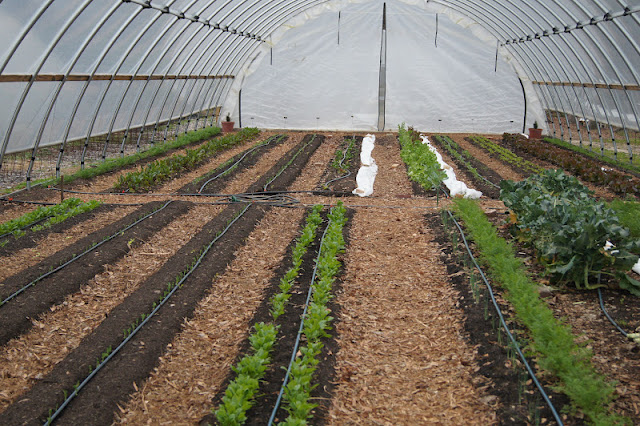Elm Street Gardens: Sparta, GA
 Recently I had a memorable visit to Elm Street Gardens in Sparta, GA. This was my second trip there--this time under the blaze of the hot sun and the sweet scent of ripe strawberries. It's ridiculously idyllic, yet avoids being too precious. Sparta is a quiet town, where even in the cold January the soft echo of cicadas buzzing during summer's dog days still reverberates. In some ways Sparta seems like the isolated remains of antebellum forebears. The planters abandoned when Sherman blazed his way to the sea, forsaking grand mansions and leaving an anemic economy.
Recently I had a memorable visit to Elm Street Gardens in Sparta, GA. This was my second trip there--this time under the blaze of the hot sun and the sweet scent of ripe strawberries. It's ridiculously idyllic, yet avoids being too precious. Sparta is a quiet town, where even in the cold January the soft echo of cicadas buzzing during summer's dog days still reverberates. In some ways Sparta seems like the isolated remains of antebellum forebears. The planters abandoned when Sherman blazed his way to the sea, forsaking grand mansions and leaving an anemic economy.Here's a little back story as I know it: Elm Street Gardens (ESG) is the dreamy offspring of Robert & Suzy Currey (of Currey and Company, purveyors of distinctive lighting and historic garden furniture). They've bestowed their expansive vision, industriousness, and good sense on this endeavor; the outcome is frankly a sight to behold. About a decade ago, I believe, they begun to revive an 1840s antebellum (it's been renovated and curated with such grace and restraint that the effect is equal parts antique and modern).
Gargantuan boxwoods flank the ornamental garden surrounding the house, bringing an air of permanence and substance to the simple and elegant grounds. The estate garden acts as a well-behaved bridesmaid, never upstaging or distracting from the bride--in this case the dignified home with generous staicases and broad proportions. These prominent staircases seem to announce a stately welcome; though impressive in scale, the stairs urge an approach toward the inviting porches.
So it's in this genteel context that their organic farming venture was born. ESG materialized with much intention and vision, if not much experience in commercial farming. The Curreys have cut no corners; this garden is done to the 9s. It is the most perfect food-producing garden I have seen--especially in that it's actually yielding abudantly. The Curreys, alongside managers Brad and Megan Fowler (also owners of Three Centuries Farm, a forage-based livestock venture) work hard and happily, conscienciously and discerningly (with sweet newborn Emiline Fowler in tow!). It's interesting how attention to technique and efficiency in this edible garden has yielded such a beautiful result. Perhaps it's in our DNA to perceive a fecund landscape as beautiful--moving in fact. Certainly there is something Romantic about this return to the earth way out in the sticks. ESG's methods move far beyond nostalgic ideals, though: they are modern and innovative in their execution and interest in progressive techniques. In this case, design was directed towards practical demands in this humid food producing space. I'm sure it's ever-evolving as they get feedback about what works. With all the industry and pragmantics, this design still translates to a purely visual language. I feel fortunate to be watching them grow.
They are selling at various markets in the region (e.g., Milledgeville, Athens, GA Organics events) and working assiduously to create a market and community for local organic food in a region where limited access and funding have hampered awareness in the slow food movement. The Curreys have embraced a difficult calling, with a heart toward bringing fresh produce to communities without affordable access to authenticly produced food.
As an aside: their next venture is a fungi production farm in the abandoned Victorian factory across the street, which they have acquired through the Georgia Trust. Another boon among this rural enclave of innovative farmers. They are also completing build-out on dormitories to house young itinerate farmers.
 |
| Bees! |
 |
| The future fungi farm in the background |
 |
| Mr. Currey has a collection of choice daylillies at the end of each row, attracting pollinators in hordes. |
 |
| Brad pulling handfulls of carrots while Megan harvests strawberries |
 |
| Impressive leeks in successive crops. |
 |
| Fruit and nut trees surround the margins of the planting rows. |
 |
| Late winter leafy greens |
 |
| Garden in late winter |
 |
| Mr. Currey has an incredible collection of historic ladderback chairs |
 |
| First wave of fungi production |














My name is Carol Huebener. We in Warren County, GA, are in the planning phase of creating a community garden. We'd like to visit your garden to learn from your successes. Is there a day when you, or someone familiar with your program development, would be available to meet with us? I can be reached Carol@Huebener.com.
ReplyDeleteThank you in advance for your assistance.